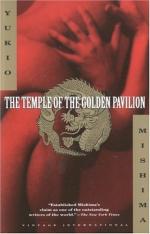|
This section contains 1,404 words (approx. 5 pages at 300 words per page) |

|
SOURCE: Chan, Stephen. “Mishima—Against a Political Interpretation.” Contemporary Review (September 1985): 133-35.
In the following essay, Chan argues that Mishima concerned himself more with culture than with politics.
Fifteen years ago the Japanese writer, Yukio Mishima, died after an abortive coup attempt. This year, Paul Schrader's film of his life has been released. Already the subject of controversy, the film depicts Mishima's death not as a political one but as an indigenous expression of values—a statement of authentic culture in which the right-wing political label was incidental.
At first glance there appears some truth in this approach. Left-wing Japanese radicals have seemed as morbidly inclined and more violent than Mishima. The Japanese Red Army caused great bloodshed, and its members lived by a spartan discipline which almost mocked Mishima's. Critics of Mishima's work have invariably become commentators on his life. There are two schools of thought: one...
|
This section contains 1,404 words (approx. 5 pages at 300 words per page) |

|


